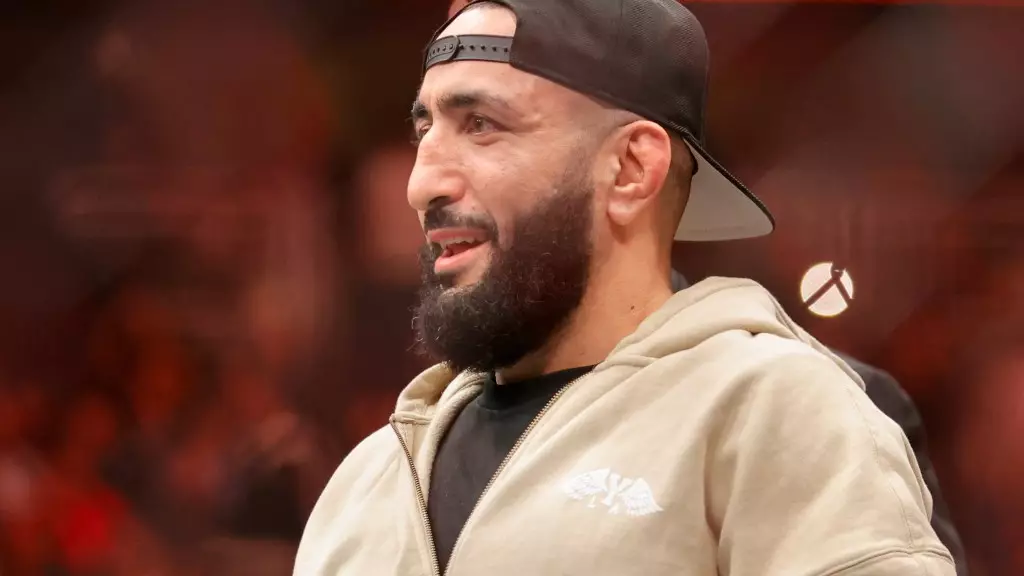Welterweight champion Belal Muhammad recently experienced a pivotal moment during his attendance at UFC 310, specifically during the much-anticipated matchup between Shavkat Rakhmonov and Ian Machado Garry. As he watched from the front row at T-Mobile Arena, Muhammad observed Rakhmonov’s performance against Garry, culminating in a five-round unanimous decision. This fight could serve as a potential precursor to Muhammad’s future clashes within the division, shaping his strategies and confidence in a landscape that thrives on competition and skill.
The fight showcased Rakhmonov’s rise as a formidable contender, extending his record to 16-0, with seven of those victories in the UFC. Yet, for Muhammad, who boasts a professional record of 24-3, this was not just a battle of skill, but also a test of his championship mettle. Muhammad entered the night cloaked with confidence, believing he could reign supreme over either opponent, but upon witnessing Rakhmonov’s struggles in securing a finish, that confidence burgeoned further.
Confidence in His Skills
Muhammad, while reflecting on the fight, articulated a strong belief in his superior skills across various aspects of mixed martial arts. He asserts that he possesses an advantage over Rakhmonov, whether on his feet striking or on the ground grappling. This stems from his performance against Leon Edwards at UFC 304, where he managed to outstrike the former champion—an achievement that solidified his reputation as a versatile fighter.
“The only thing I saw is that I win,” Muhammad declared, showcasing his unwavering self-belief. His mindset dives deeper than mere bravado; it encapsulates the analytical nature of a fighter who eagerly studies his opponents. By dissecting Rakhmonov’s approach, particularly his cautiousness during clinch recoveries, Muhammad has devised a game plan that anticipates not only strikes but tactical positions in the octagon.
Muhammad’s assertion that he is the best striker in the division could be perceived as both confidence and a calculated psychological tactic. He recognizes that opponents often underestimate fighters who emphasize grappling, but by highlighting his striking arsenal, he seeks to disarm any preconceived notions regarding his capability.
Strategizing Against Rakhmonov
Watching Rakhmonov and Garry on the canvas raised concerns for Muhammad. Notably, he expressed disappointment over the lack of decisive action during clinches—a space where moments are earned and fought for. Muhammad’s determination to maintain relentless pressure is remarkable. “I wouldn’t have given him those times to rest,” he states, a direct commentary reflecting his understanding of the psychological warfare inherent in mixed martial arts.
This mentality sets a stark contrast with what transpired during the Rakhmonov-Garry match. Where Rakhmonov opted for patience in bouts of clench situations, Muhammad is adamant that he would implement a continuous onslaught, leaving no room for respite. The intensity he brings into the octagon could very well place Rakhmonov in a position far removed from what he experienced at UFC 310.
He envisions a fight with Rakhmonov as an exertion of overwhelming force, transforming the feel of the bout into a struggle where his opponents could feel as though they are “drowning” in pressure. Muhammad’s focus is prominently fixated on disrupting Rakhmonov’s rhythm, thereby making the fight an arduous journey for him rather than a pleasurable dance.
As Muhammad maintains a keen watch on the welterweight division, his confidence rises not merely from his abilities but also from careful observation of his potential challengers. Adjusting his strategy based on the performances of his rivals, he represents a fighter who combines intuition with intellectual analysis. As he prepares for his next bout, Muhammad’s insights from UFC 310 will undoubtedly influence his training, fortifying his entrenched self-belief while strategizing to endure the pressures of championship contention.
In a sport defined by the unpredictable nature of combat, Muhammad’s cerebral approach, bolstered by confidence and adaptability, may guide him to continued success in the octagon. As he eagerly awaits his next opportunity, one can’t help but wonder about the electrifying battles that lay ahead in the welterweight realm.

